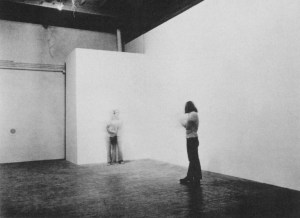Gabi Schaffzin //
Towards the beginning of her talk at Theorizing the Web 2018, Alanna Reyes asks, “is it possible that we are perpetuating ides about our bodies and our technologies that we use by writing them into our real lives?” The scholar (a PhD in Science Studies & Communication at UC San Diego) goes on to use fictional super heroes—from Iron Man and Batman to the characters in the anime My Hero Academia—to suggest that we might learn a lot from these figures about how our world is structured for someone requiring assistive devices. Eventually, Reyes argues that perhaps the trope of the super hero as genius—even when including non-male presenting, people of color, youth, and/or varying classes—is dangerous in the ways that it still only belongs to geniuses. She presents My Hero Academia, a show that portrays a society wherein 80% of the population have access to assistive technologies (or, in the parlance of the show, “quirks”) and the protagonist’s struggles with not having one. This scenario, she argues, is perhaps a healthy counter to the idea that only the tech geniuses of our time will be able to survive a “real” world in which design for disabled bodies is secondarily considered.
Keep in mind that Alanna presented during the first panel I went to at Theorizing the Web. What followed (and in full disclosure, I am on the organizing committee for this conference) was a refreshing amalgam of takes on technology that were both theoretical and practical in nature. One keynote featured a professor in Digital Studies from the University of Michigan sitting alongside the Director of the Technology for Liberty Program at the ACLU of Massachusetts. Perhaps one of the most important points of that panel (which included a number of other individuals across a spectrum of scholar/practitioner) was that the sorts of “fairness” algorithms governing bodies today (predictive policing, sentencing systems, even the software running “self-driving” cars) are both inherently biased and positioned as anything but.
In authoring this post, I struggled to decide what panels to review here, wanting to make sure that their subject-matter was aligned with this blog’s “medical and health humanities” theme. Thinking about the conference’s full program, however, it occurred to me how often issues of the body were central to a panel’s topic. Rachel Coldicutt’s talk (“The Woman’s Gaze and The Robot’s Gaze”) was not medical in nature, for instance, but her argument that the “algorithmic gaze” (think Amazon Look) is replacing the woman’s gaze required the speaker to cover representations of the female body across generations of art and technology. At one point, she noted that there has been a 10% drop in cosmetic surgery in the UK, partially attributed to the widespread use of filtering and face-tuning apps.
It is easy to consider medical humanities as a primarily historical or literary endeavor. Attending conferences such as Theorizing the Web, however, reinforces the view that a humanist approach to medicine and health allows for the inclusion of issues surrounding contemporary design and technology, as well.



